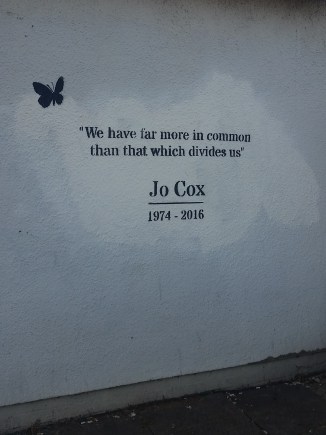by Will Davies
Originally posted on PERCblog
1.The Geography reflects the economic crisis of the 1970s not the 2010s
It became clear early on in the night that Leave had extraordinary levels of support in the North East, taking 70% of the votes in Hartlepool and 61% in Sunderland. It subsequently emerged that Wales had voted for Leave overall, especially strongly in the South around areas such as Newport. It is easy to focus on the recent history of Tory-led austerity when analysing this, as if anger towards elites and immigrants was simply an effect of public spending cuts of the past 6 years or (more structurally) the collapse of Britain’s pre-2007 debt-driven model of growth.
But consider the longer history of these regions as well. They are well-recognised as Labour’s historic heartlands, sitting on coalfields and/or around ship-building cities. Indeed, outside of London and Scotland, they were amongst the only blobs of Labour red on the 2015 electoral map. There is no reason to think that they would not stay red if an election were held in the autumn. But in the language of Marxist geographers, they have had no successful ‘spatial fix’ since the stagflation crisis of the 1970s. Thatcherism gutted them with pit-closures and monetarism, but generated no private sector jobs to fill the space. The entrepreneurial investment that neoliberals always believe is just around the corner never materialised.
Labour’s solution was to spread wealth in their direction using fiscal policy: public sector back-office jobs were strategically relocated to South Wales and the North East to alleviate deindustrialisation, while tax credits made low productivity service work more socially viable. This effectively created a shadow welfare state that was never publicly spoken of, and co-existed with a political culture which heaped scorn on dependency. Peter Mandelson’s infamous comment, that the Labour heartlands could be depended on to vote Labour no matter what, “because they’ve got nowhere else to go” spoke of a dominant attitude. In Nancy Fraser’s terms, New Labour offered ‘redistribution’ but no ‘recognition’.
This cultural contradiction wasn’t sustainable and nor was the geographic one. Not only was the ‘spatial fix’ a relatively short-term one, seeing as it depended on rising tax receipts from the South East and a centre left government willing to spread money quite lavishly (albeit, discreetly), it also failed to deliver what many Brexit-voters perhaps crave the most: the dignity of being self-sufficient, not necessarily in a neoliberal sense, but certainly in a communal, familial and fraternal sense.
2. Handouts don’t produce gratitude
By the same token, it seems unlikely that those in these regions (or Cornwall or other economically peripheral spaces) would feel ‘grateful’ to the EU for subsidies. Knowing that your business, farm, family or region is dependent on the beneficence of wealthy liberals is unlikely to be a recipe for satisfaction (see James Meek’s recent essay in the London Review of Books on Europhobic farmers who receive vast subsidies from the EU). More bizarrely, it has since emerged that regions with the closest economic ties to the EU in general (and not just of the subsidised variety) were most likely to vote Leave.
While it may be one thing for an investment banker to understand that they ‘benefit from the EU’ in regulatory terms, it is quite another to encourage poor and culturally marginalised people to feel grateful towards the elites that sustain them through handouts, month by month. Resentment develops not in spite of this generosity, but arguably because of it. This isn’t to discredit what the EU does in terms of redistribution, but pointing to handouts is a psychologically and politically naïve basis on which to justify remaining in the EU.
In this context, the slogan ‘take back control’ was a piece of political genius. It worked on every level between the macroeconomic and the psychoanalytic. Think of what it means on an individual level to rediscover control. To be a person without control (for instance to suffer incontinence or a facial tick) is to be the butt of cruel jokes, to be potentially embarrassed in public. It potentially reduces one’s independence. What was so clever about the language of the Leave campaign was that it spoke directly to this feeling of inadequacy and embarrassment, then promised to eradicate it. The promise had nothing to do with economics or policy, but everything to do with the psychological allure of autonomy and self-respect. Farrage’s political strategy was to take seriously communities who’d otherwise been taken for granted for much of the past 50 years.
This doesn’t necessarily have to translate into nationalistic pride or racism (although might well do), but does at the very least mean no longer being laughed at. Those that have ever laughed at ‘chavs’ (such as the millionaire stars of Little Britain) have something to answer for right now, asRhian E. Jones’ Clampdown argued. The willingness of Nigel Farrage to weather the scornful laughter of metropolitan liberals (for instance through his periodic appearances on Have I Got News For You) could equally have made him look brave in the eyes of many potential Leave voters. I can’t help feeling that every smug, liberal, snobbish barb that Ian Hislop threw his way on that increasingly hateful programme was ensuring that revenge would be all the greater, once it arrived. The giggling, from which Boris Johnson also benefited handsomely, needs to stop.
3. Brexit was not fuelled by a vision of the future
One of the most insightful things I saw in the run-up to the referendum was this video produced by openDemocracy’s Adam Ramsey and Anthony Barnett discussing their visit to Doncaster, another Labour heartland. They chose Doncaster because it looked set to be a strong pro-Leave location, and wanted to understand what was at work in this. Crucially, they observed that – in strong contrast to the Scottish ‘Yes’ movement – Brexit was not fuelled by hope for a different future. On the contrary, many Leavers believed that withdrawing from the EU wouldn’t really change things one way or the other, but they still wanted to do it. I’ve long suspected that, on some unconscious level, things could be even stranger than this: the self-harm inflicted by Brexit could potentially be part of its appeal. It is now being reported that many Leave voters are aghast at what they’ve done, as if they never really intended for their actions to yield results.
This taps into a much broader cultural and political malaise, that also appears to be driving the rise of Donald Trump in the US. Amongst people who have utterly given up on the future, political movements don’t need to promise any desirable and realistic change. If anything, they are more comforting and trustworthy if predicated on the notion that the future is beyond rescue, for that chimes more closely with people’s private experiences. The discovery of the ‘Case Deaton effect’ in the US (unexpected rising mortality rates amongst white working classes) is linked to rising alcohol and opiate abuse and to rising suicide rates. It has also been shown to correlate closely to geographic areas with the greatest support for Trump. I don’t know of any direct equivalent to this in the UK, but it seems clear that – beyond the rhetoric of ‘Great Britain’ and ‘democracy’ – Brexit was never really articulated as a viable policy, and only ever as a destructive urge, which some no doubt now feel guilty for giving way to.
Thatcher and Reagan rode to power by promising a brighter future, which never quite materialised other than for a minority with access to elite education and capital assets. The contemporary populist promise to make Britain or American ‘great again’ is not made in the same way. It is not a pledge or a policy platform; it’s not to be measured in terms of results. When made by the likes of Boris Johnson, it’s not even clear if it’s meant seriously or not. It’s more an offer of a collective real-time halucination, that can be indulged in like a video game.
The Remain campaign continued to rely on forecasts, warnings and predictions, in the hope that eventually people would be dissuaded from ‘risking it’. But to those that have given up on the future already, this is all just more political rhetoric. In any case, the entire practice of modelling the future in terms of ‘risk’ has lost credibility, as evidenced by the now terminal decline of opinion polling as a tool for political control.
4. We now live in the era of data, not facts
One of the complaints made most frequently by liberal commentators, economists and media pundits was that the referendum campaign was being conducted without regard to ‘truth’. This isn’t quite right. It was conducted without adequate regard to facts. To the great frustration of the Remain campaign, their ‘facts’ never cut through, whereas Leave’s ‘facts’ (most famously the £350m/week price tag of EU membership) were widely accepted.
What is a ‘fact’ exactly? In her book A History of the Modern Fact, Mary Poovey argues that a new way of organising and perceiving the world came into existence at the end of the 15thcentury with the invention of double-entry book-keeping. This new style of knowledge is that offacts, representations that seem both context-independent, but also magically slot seamlessly into multiple contexts as and when they are needed. The basis for this magic is that measures and methodologies (such as accounting techniques) become standardised, but then treated as apolitical, thereby allowing numbers to move around freely in public discourse without difficulty or challenge. In order for this to work, the infrastructure that produces ‘facts’ needs careful policing, ideally through centralisation in the hands of statistics agencies or elite universities (the rise of commercial polling in the 1930s was already a challenge to the authority of ‘facts’ in this respect).
This game has probably been up for some time. As soon as media outlets start making a big deal about the FACTS of a situation, for instance with ‘Fact check’ bulletins, it is clear that numbers have already become politicised. ‘Facts’ (such as statistics) survived as an authoritative basis for public and democratic deliberation for most of the 200 years following the French Revolution. But the politicisation of social sciences, metrics and policy administration mean that the ‘facts’ produced by official statistical agencies must now compete with other conflicting ‘facts’. The deconstruction of ‘facts’ has been partly pushed by varieties of postmodern theory since the 1960s, but it is also an inevitable effect of the attempt (beloved by New Labour) to turn policy into a purely scientific exercise.
The attempt to reduce politics to a utilitarian science (most often, to neo-classical economics) eventually backfires, once the science in question then starts to become politicised. ‘Evidence-based policy’ is now far too long in the tooth to be treated entirely credulously, and people tacitly understand that it often involves a lot of ‘policy-based evidence’. When the Remain camp appealed to their ‘facts’, forecasts, and models, they hoped that these would be judged as outside of the fray of politics. More absurdly, they seemed to imagine that the opinions of bodies such as the IMF might be viewed as ‘independent’. Unfortunately, economics has been such a crucial prop for political authority over the past 35 years that it is now anything but outside of the fray of politics.
In place of facts, we now live in a world of data. Instead of trusted measures and methodologies being used to produce numbers, a dizzying array of numbers is produced by default, to be mined, visualised, analysed and interpreted however we wish. If risk modelling (using notions of statistical normality) was the defining research technique of the 19th and 20th centuries, sentiment analysis is the defining one of the emerging digital era. We no longer have stable, ‘factual’ representations of the world, but unprecedented new capacities to sense and monitor what is bubbling up where, who’s feeling what, what’s the general vibe.
Financial markets are themselves far more like tools of sentiment analysis (representing the moodof investors) than producers of ‘facts’. This is why it was so absurd to look to currency markets and spread-betters for the truth of what would happen in the referendum: they could only give a sense of what certain people felt would happen in the referendum at certain times. Given the absence of any trustworthy facts (in the form of polls), they could then only provide a sense of how investors felt about Britain’s national mood: a sentiment regarding a sentiment. As the 23rd June turned into 24th June, it became manifestly clear that prediction markets are little more than an aggregative representation of the same feelings and moods that one might otherwise detect via twitter. They’re not in the business of truth-telling, but of mood-tracking.
5. The least ‘enslaved’ nation in the EU just threw off its ‘shackles’
If the EU worked well for any nation in Europe, it was the UK. Thanks to the scepticism and paranoia of Gordon Brown, Britain dodged the catastrophic error of the single currency. As a result, it has been relatively free to pursue the fiscal policies that it deems socially and politically desirable. The fact that it has consistently chosen neoliberal ones is not really the fault of the EU, the stability and growth pact notwithstanding. But in contrast to southern European members of the EU, Britain is scarcely constrained at all. Instead, it has benefited from economic stability, a clear international regulatory framework and a sense of cultural fraternity with other member states. One could even argue that, being in the EU but outside of the Eurozone, Britain has had the best deal of any member state during the 21st century.
This has been abandoned. Meanwhile, nations that might genuinely describe themselves as ‘shackled’, have suffered such serious threats to their democracy as to have unelected Prime Ministers imposed upon them by the Troika, and have had their future forcibly removed thanks to the European Union, might look at Brexit and wonder.














